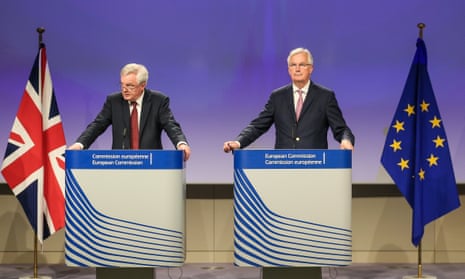Britain may not start negotiating its future trade relationship with the EU until the end of the year, ministers are admitting privately.
Originally it was hoped that phase two of the Brexit talks – covering a future trade deal, not just the withdrawal arrangements – would start after October, but ministers involved in the talks now think this timetable could slip.
Effectively putting off trade talks until 2018 would be embarrassing for the British government, which at one stage said it was going to insist on negotiating the withdrawal agreement – the logistics of leaving the EU – alongside the post-Brexit trade agreement.
Earlier this year David Davis, the Brexit secretary, said he would generate “the row of the summer” by insisting on the two sets of talks taking place in parallel. But when negotiations formally opened in June, Britain agreed to discuss the withdrawal agreement first, with talks only moving on to trade once sufficient progress had been made on three key withdrawal issues: the rights of EU nationals, the UK’s “Brexit bill”, and Ireland.
Michel Barnier, the EU’s chief Brexit negotiator, said EU leaders would decide at a summit in October whether enough progress had been made to justify moving to phase two.
Earlier this summer, UK ministers were optimistic that the deadline would be met. But now some cabinet ministers have privately admitted that may not happen.
One senior minister involved in the talks told the Guardian it was guesswork to predict whether that timetable was now feasible, and that there was speculation that phase two of the talks may not start until December.
The two Brexit papers published by the government this week, on customs and Northern Ireland, were intended to force the pace, and further papers are due to be published next week. The next round of Brexit talks in Brussels, the third, will start in the final week of August.
Asked about the prospect of the trade talks being delayed, Theresa May just said that the talks had been “constructive” so far but that there was “a lot to be done”.
If phase two slips to the end of the year, “it is not a huge problem for the EU, they know in terms of timing they have the upper hand,” said Christian Odendahl, Berlin representative for the Centre for European Reform thinktank.
British government sources think Brexit negotiations would be easier at the end of the year if Germany’s pro-business Free Democratic party returns to government after federal elections. On current polls, the small liberal party could be a junior coalition partner to Angela Merkel’s larger Christian Democrats.
Christian Lindner, the FDP leader, said recently that “all options need to be on the table” on Brexit, comments that have been interpreted by British media as meaning Britain might be able to cut migration and remain in the single market. However, Lindner also said there should be “no cuts in the four freedoms of the single market” – the free movement of goods, capital, services, and labour – the conventional EU red line.
Odendahl said it wouldn’t be a “particularly good strategy” for the British government to rely on the FDP to alter the course of Brexit. “The FDP is probably closest to what the British would like to have in the German government, but that is not saying that much,” he said, describing differences on Europe as “nuances”.
“Would they [the FDP] spend the precious few bargaining chips they have in changing Germany’s position or Europe’s position on Brexit? I don’t think that would be the case.”
A delay until December or January could leave the UK with just 10 months to negotiate the key aspects of a future trade deal. Britain is not due to leave the EU until the end of March 2019, but when Barnier was appointed he said he wanted to wrap up the talks by October 2018 to allow time for the final deal to be ratified by the European parliament, the European council and the British parliament.
The government accepts that a transitional deal will be necessary after Brexit, but it wants to know what the final UK-EU trade relationship will be before that transitional phase begins. That means there would have to be at least an outline trade agreement by October 2018.
Tom Brake, the Lib Dem Brexit spokesman, said: “This is a humiliating climbdown for David Davis. Once again the bluff and bluster of Tory eurosceptics is being exposed to the cold reality of Brexit.
“We were told the EU would be begging us for a trade deal, now even the hard Brexiteers in this government are having to admit Brussels won’t roll over just because the Germans sell us cars.”
